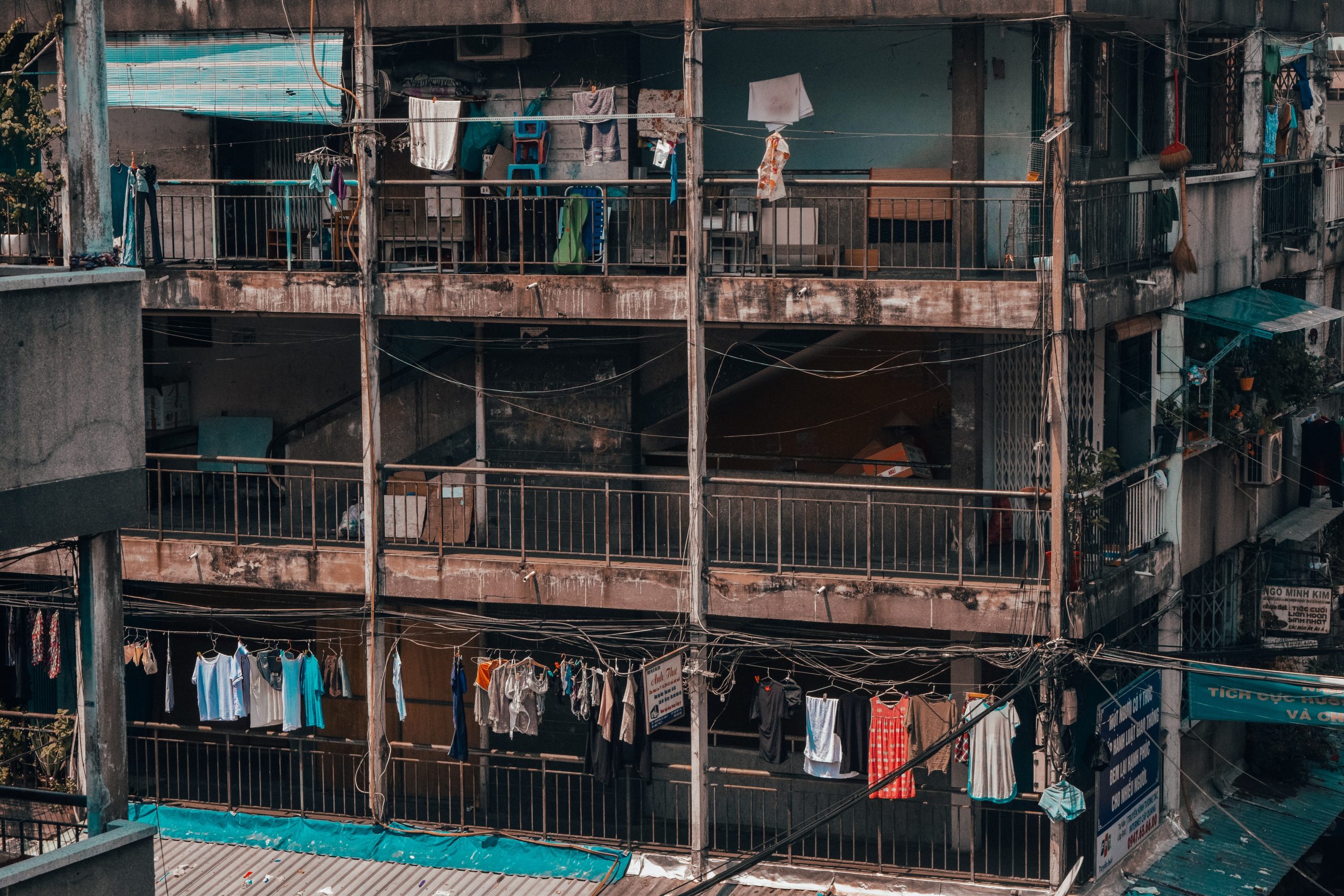At any given time, there are about 20 million people on the move in the world. When there’s war, terrorism, extreme weather events, or other disruptions, this can grow to 80 million people trying to get to safety. We hear of illegal immigrants crossing borders and thousands of people walking north through Central America to the US border. What we don’t hear about is why. We also don’t hear many politicians talking about addressing these people’s problems at their origin, rather than at our borders.
It is imperative we address these problems. We need to help create sustainable communities—not just for the people in them, but for our sake as well. What happens in one part of the world reverberates everywhere.
Rapid urbanization has resulted in highly concentrated centres of populations with increasing disparities in standards of living and conditions that are ideal for the social conflict and disease.
According to the United Nations 54% of the global population now reside in cities, a percentage estimated to increase to 68% by 2050. The majority live in starkly marginalized conditions.1
Conflict and environmental change have also displaced large numbers of people adding to transnational migration, largely to urban centres.
The UNHCR estimates 13.6 million people were displaced due to conflict or persecution in 2018, equivalent to an average of 37,000 people being forced to flee their homes every day in 2018.2
There were 70.8 million displaced worldwide in 2018 as a result of persecution, conflict, violence, or human rights violations.
Asylum-seekers submitted 1.7 million new claims. With 254,300 such claims, the United States of America was the world’s largest recipient of new individual applications, followed by Peru (192,500) Germany (161,900), France (114,500) and Turkey (83,800). Less than 3% of refugees returned to their country of origin.3
At home, in the West, citizens are increasingly dissatisfied with the distribution of opportunities, wealth, and living standards. There are increasing concerns about the impact of the 4th industrial revolution – the embedding of micro-technology and artefact intelligence into traditional technologies and services; innovations that threaten jobs, potentially displacing large numbers of people.
These two trends have provoked fears that fuel nationalism, anti-immigrant reactions, and eroded confidence in the existing pillars of the post-World War II world order – democracy and capitalism.
Skepticism with politicians has added to dissatisfaction with traditional authoritative structure and renewed demands for democratic reform.
Thierry de Montbrial, of the French Institute of International Relations notes: “There is a social revolution with a growing demand for participatory democracy.
The traditional system of enforcing power from top to bottom is increasingly being challenged.”
The Occupy Movement, violent protests against the world order represented by the G-8, the Yellow Jacket Movement in France that has spread as far as Australia, protests in Chile, Lebanon, Paris, Hong Kong, the move to withdraw Britain from the European Union, and the United States withdrawal from several international treaties are signs of changing attitudes and values. Politicians seem unable to agree on how to respond to these challenges.
But there is another serious threat, one posed by extreme marginalization in emerging economies and democracies.
While we respond to our own inner city issues of poverty, lack of housing, elevated crime, and physical neglect, most cities in developing economies must deal with slums. These, unlike our ghettos, are areas of extreme overcrowding, dehumanization, and neglect, a difference that is more than a matter of semantics. In some cities, slum dwellers represent up to 80% of the population.4
Tens of millions in Mumbai, Calcutta, Rio de Janeiro, São Paulo, Mexico City, Johannesburg, Nairobi, Bangkok, and Manila live in slums with such dire conditions that their extreme marginalization is incomprehensible to those living on the other side of the poverty line.
According to the World Health Organization (WHO) slums are home to an estimated 828 million people, a third of the world’s urban population, and expected to reach 3 billion in the next 30 years.5 This explosion will result in mega cities that will greatly surpass New York, Los Angeles, and London.
The World Economic Forum projects that Lagos will have a population of 88 million, Dhaka 76 million, and Kinshasa 63 million.6
Exposure to crime, violence, and the stress associated with constant fear for one’s safety within slums, creates high levels of mistrust and low social capital providing ideal conditions for conflict over resources, establishment of gangs; trade in illicit substances, arms, and human trafficking, and the radicalization of youth.7
The Tony Blair Institute for Global Change has warned, for instance, of the danger of ignoring school-aged children who are particularly vulnerable to radicalization by jihadi recruiters.8
Slums also offer ideal conditions for the incubation of marginal and obscure microbes, and as gateways for the transmission of pathogens and new strains of infectious diseases.9
Since 2008 the Global Health Program has reported increases in global outbreaks of preventable diseases including measles, mumps, polio, rubella, whooping cough, chicken pox, cholera, diphtheria, meningitis, rotavirus, and typhoid.
The spread of severe acute respiratory syndrome, Ebola, and cholera (by Nepalese Peacekeepers) are examples of global transmissions.
Global connectivity means that the mass migration of people for economic, political, or environmental influences will increase in the twenty-first century. As Filippo Grandi, the United Nations High Commissioner for Refugees notes: “What we are seeing in these figures is further confirmation of a longer-term rising trend in the number of people needing safety from war, conflict, and persecution.”10
The global impact of famine, conflict, and disaster, even when on the other side of the globe, has changed, as must our preparedness and response.
The Ethiopian famine of the 1980’s resulted in the death of tens of thousands. There were, however, no mass migrations of Ethiopians. Absent cell phones and the internet, people resigned themselves to their fate and remained in what became death camps.
Today, the third of humanity living in slums, soon to be 3 billion, or the 70.8 million displaced worldwide have widespread access to cell phones, the internet, and social media, providing access not only to highways of information but information about pathways for crossing multiple borders to the shores of North Africa and Europe.
Globalization is not just economic connections. Globalism also means the free flow of ideology, terrorism, and disease. Globalism can’t be unwound by nationalism in countries in which half the population have roots all over the world and resulted in unprecedented risks – but this is history repeating itself.
The challenges of marginalization have reached manifestly catastrophic conditions, and the choices we make this decade will determine the fate of human societies for millennia.
The question for policy makers and politicians should not be what to do about the endless cues of illegal migrants at our borders, but how do we mitigate the global inequalities that drive mass migration from occurring in the first place?
In September of 2000, 191 member states agreed to United Nations Millennium Development Goals to:11
- Eradicate extreme poverty and hunger;
- Achieve universal primary education;
- Promote gender equality and empower women;
- Reduce child mortality;
- Improve maternal health;
- Combat HIV/AIDS, malaria, and other diseases;
- Ensure environmental sustainability; and
- Develop a global partnership for development.
These goals were to have been achieved by 2015.
Having failed, in 2015 the UN passed a new resolution on transforming our world: the 2030 Agenda for Sustainable Development, with a new set of goals to be achieved by 2030.
The resolution resolves to end poverty and hunger everywhere; to combat inequalities within and among countries; to build peaceful, just and inclusive societies; to protect human rights and promote gender equality and the empowerment of women and girls; to ensure the lasting protection of the planet and its natural resources; and to create the conditions for sustainable, inclusive, and sustained economic growth, shared prosperity and decent work for all, taking into account different levels of national development and capacities.12
Two primary institutions for the achievement of sustainable development and international order include the Bretton Woods institutions – the International Monetary Fund (IMF) and World Bank Group, founded in 1944 at the United Nations Monetary Conference in Bretton Woods, New Hampshire to regulate the international monetary and financial order after the conclusion of World War II.
Canada plays an important role in the governance of both the IMF and World Bank Group as one of the largest members at both institutions.
Canada’s G7 Presidency last year (2017-18) focused our commitment to meeting the Agenda for Sustainable Development and focus on issues that are central to our values; improved access to education for women and girls, tackling corruption, and supporting good governance.
Amongst Canada’s objectives for 2018 was to address the many emerging issues of a non-economic/financial nature, such as corruption and inequality that can have a significant impact on countries’ macroeconomic growth and stability.
Endemic systemic inequality impacts corruption which in turn affects economies by undermining key state functions such as fiscal policy, market oversight, and enforcement activities. As a result, systemic corruption can significantly undermine economic performance and the state’s ability to deliver inclusive and sustainable growth by reducing investment, the provision of social services, and confidence in the state more generally.
Canadian foreign policy has lead the G7 with the aim of promoting IMF efforts to enhance its anti-corruption frameworks, and along with other G7 countries, committed to voluntary monitoring of anti-bribery and anti-money laundering/combating the financing of terrorism frameworks through annual IMF surveillance.
Promoting ethical, sustainable and transparent policies in foreign aid and development also serves to foster trust and influence amongst recipient economies. These efforts make Canada a leader in ensuring that governments prevent the bribery of public officials and the concealment of proceeds of corrupt acts.
The antecedents to corruption, inequality, and economic stability however remain colossal. Problems seem to be fast outpacing rhetoric, and worse, despite their commitment, states remain entrenched in national rather than global interests.
Humanity is now interwoven into a complex web; what happens in one part of the world will not remain isolated, it will reverberate throughout the globe affecting all of us everywhere. We are well past the point when lofty sounding statements can be relied upon to punt the proverbial can down the road; it is time to see meaningful and transformative changes from those in positions of leadership and influence.
It is therefore incumbent on each of us to take the time to understand the world we live in and to differentiate between the anecdotal, empirical, and moral drivers of policy making.



